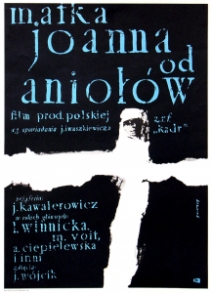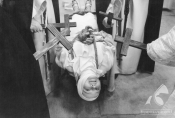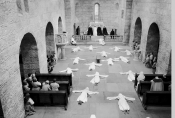MOTHER JOAN OF THE ANGELS [1960]

year:
- 1960
release date:
- 9 II 1961
runtime:
- 103 min
directed by:
- Jerzy Kawalerowicz
written by:
- Tadeusz Konwicki, Jerzy Kawalerowicz
director of photography:
- Jerzy Wójcik
cast:
- Lucyna Winnicka [mother Joanna of the Angels], Mieczysław Voit [Father Józef Suryn and Rabbi], Anna Ciepielewska [Sister Małgorzata], Maria Chwalibóg [Antosia, an innkeeper], Kazimierz Fabisiak [Father Brym], Stanisław Jasiukiewicz [Chrząszczewski], Zygmunt Zintel [Wincenty Wołodkowicz], Jerzy Kaczmarek [Kaziuk], Franciszek Pieczka [Odryn], Jarosław Kuszewski [Juraj], Lech Wojciechowski [Piątkowski]
edited by:
- Wiesława Otocka
music by:
- Adam Walaciński
production design:
- Roman Mann, Tadeusz Wybult
produced by:
- Studio Filmowe „Kadr”
executive producer:
- Ludwik Hager
awards:
-
• IFF Cannes (France) 1961: Special Jury Award
• Award of the French Academy of Film 196: Crystal Star for Lucyna Winnicka
• Warsaw Mermaid 1961
• Golden Duck 1961
• Award of the Minister of Culture and Arts of the 1st degree 1962 for Jerzy Kawalerowicz and Jerzy Wójcik
• International Short Film Festival Oberhausen (Germany) 1963: Young Western Germany Critics Award
• IFF Panama (Panama) 1966: the Tribunascope Award for Lucyna Winnicka, Anna Ciepielewska and Zygmunt Zintl
About the film
A drama which can be interpreted in universal terms as a study in human psychology that investigates resistance to the voluntarily accepted limitations of one’s own nature, and the imposed bans. This psycho-philosophical theme overlaps with reflections on restricting dogmas, different kinds of love that always require − according to the laws of nature − to be fulfilled, or, finally, the ignorance of one’s own soul, consequently leading to tragedy. One of the most visually stunning Polish films.
A monastery in the Polish borderlands in the eighteenth century. Father Suryn comes to exorcise Abbess Joanna who has been possessed by demons, but the mission ends when spontaneous feelings develop between them. To save Joanna, Suryn commits an absurd crime on innocent farmhands, thereby condemning his soul to eternal damnation. Plagued by the need for physical love, of which he was made aware by Joanna, he becomes a victim of false ideas rooted in his unshakeable faith. He calls these burgeoning feelings, a possession, deluding himself that the truth about the soul and the human body is thereby suppressed.
Jan Słodowski, Leksykon polskich filmów fabularnych, Warszawa 1996
Articles
-
Mother Joan of the Angels - Where are wolves born?
Mariola Dopartowa
50 Years of Polish Film School, Warsaw 2008
-
Loneliness, anguish, love nad consolation
Denitza Bantcheva
About Night Train, Mother Joan of the Angels, Pharaoh and The Inn















